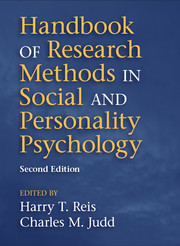Book contents
- Handbook of Research Methods in Social and Personality Psychology
- Handbook of Research Methods in Social and Personality Psychology
- Copyright page
- Contents
- Contributors
- Introduction to the Second Edition
- Introduction to the First Edition
- Chapter one Scratch an Itch with a Brick
- Part one Design and Inference Considerations
- Part two Procedural Possibilities
- Chapter six Using Physiological Indexes in Social Psychological Research
- Chapter seven Research Methods in Social and Affective Neuroscience
- Chapter eight Behavior Genetic Research Methods
- Chapter nine Methods of Small Group Research
- Chapter ten Inducing and Measuring Emotion and Affect
- Chapter eleven Complex Dynamical Systems in Social and Personality Psychology
- Chapter twelve Implicit Measures in Social and Personality Psychology
- Chapter thirteen The Mind in the Middle
- Chapter fourteen Behavioral Observation and Coding
- Chapter fifteen Methods for Studying Everyday Experience in Its Natural Context
- Chapter sixteen Survey Research
- Chapter seventeen Conducting Research on the Internet
- Part three Data Analytic Strategies
- Author Index
- Subject Index
Chapter fifteen - Methods for Studying Everyday Experience in Its Natural Context
from Part two - Procedural Possibilities
Published online by Cambridge University Press: 05 June 2014
- Handbook of Research Methods in Social and Personality Psychology
- Handbook of Research Methods in Social and Personality Psychology
- Copyright page
- Contents
- Contributors
- Introduction to the Second Edition
- Introduction to the First Edition
- Chapter one Scratch an Itch with a Brick
- Part one Design and Inference Considerations
- Part two Procedural Possibilities
- Chapter six Using Physiological Indexes in Social Psychological Research
- Chapter seven Research Methods in Social and Affective Neuroscience
- Chapter eight Behavior Genetic Research Methods
- Chapter nine Methods of Small Group Research
- Chapter ten Inducing and Measuring Emotion and Affect
- Chapter eleven Complex Dynamical Systems in Social and Personality Psychology
- Chapter twelve Implicit Measures in Social and Personality Psychology
- Chapter thirteen The Mind in the Middle
- Chapter fourteen Behavioral Observation and Coding
- Chapter fifteen Methods for Studying Everyday Experience in Its Natural Context
- Chapter sixteen Survey Research
- Chapter seventeen Conducting Research on the Internet
- Part three Data Analytic Strategies
- Author Index
- Subject Index
Summary
Keywords
Information
- Type
- Chapter
- Information
- Publisher: Cambridge University PressPrint publication year: 2014
Accessibility standard: Unknown
Why this information is here
This section outlines the accessibility features of this content - including support for screen readers, full keyboard navigation and high-contrast display options. This may not be relevant for you.Accessibility Information
- 53
- Cited by
